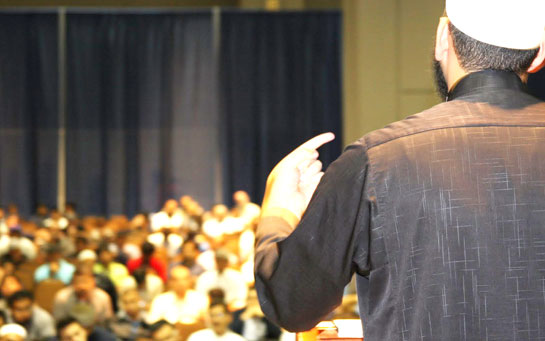
Most area community members and leaders say Imams
are under compensated
Where they were once simply defined as a leader of prayer in a masjid, many Imam’s now find themselves wearing multiple kufis.
By day they are guarders of the minbar, leading daily prayers. Later in the day they are counselors and administrators. By early evening they are teachers in Islamic studies classes and by night they are motivational speakers and fundraisers at community dinners.
The Muslim Link asked its readers what they thought their local Imam’s were worth, both financially and in terms of their social and spiritual impact on the community.
“If it’s a job requiring such a high level of education, experience, skill, and only a few people are equipped to do it, [then] why do masajid insist on paying [imams] barely more than a cashier at Walmart? if someone had such a high quality of skill in an area where only a few people had it, in the corporate world they would easily be making well above six figures without question, if not over two hundred [thousand].” wrote Omar Usman in response to the survey.
While the majority surveyed believed that their local Imam should be getting paid more, there was a distinct difference in the roles and responsibilities of the Imam in each situation.
When each Imam plays a different role, how does the community accurately determine how much he should get paid?
Determining the worth of an Imam is far more complicated than simply matching a salary to credentials or a job description; it requires a redefinition of the role of the Imam in the modern American Muslim context.
One local Imam said the question lends itself to a far more complex answer that perhaps won’t be fully answered for another generation or so. As such, he is weary of being too harsh when it comes to situations where Imams may not be compensated as well as they should be.
“It’s unfair to criticize the community too harshly because the earth is moving under our feet and the number of individuals we are talking about is so small that one can’t really have a reliable statistc in terms of their compensation of Imams across the board,” said Imam Johari Abdul-Malik of Dar Al Hijrah in Falls Church, Virginia.
While there are communities that hire full time Imams who also actively serve as community leaders, fundraisers, counselors and in many other capacities, along side their prayer-leading duties, the numbers of those situations are few compared to the number of communities that expect an Imam to simply serve as a congregational prayer leader or that choose not to hire a full time Imam at all, argued Abdul-Malik.
Where the traditional definition defines Imam as a leader of prayer in a masjid, the contemporary definition of the Imam doesn’t yet exist, said Abdul-Malik.
“The American Muslim community now has to not only wrestle with redefining that role of the Imam but [also] subdividing that role into those [other] roles and we don’t have nomenclature for these roles,” Johari
Compounding the issue of defining the role of the Imam in the modern American masjid and subsequently the “worth” of the Imam is the often complicated relationship the Imam has with masjid leadership, said Hayder Qaadri, president of the Islamic Community Center of Laurel.
Qaadri argues that there is a definitive gap between the faith perspective of the Imam and the business perspective of the board.
“You have to have the people who are on the board or council make sure that they have their sources of Islamic knowledge as well. They can be educated in Islam to bring them closer to the bridge on that side and the Imams can take some business type of training or be open minded from that perspective,” suggested Qaadri.
Although he too feels as though standardization of compensation for Imam’s in American masjids requires a lot more preliminary legwork as well as observation of the natural development of the American Muslim community mindset, Qaadri believes it is the responsibility of the board in each Masjid to care for the Imam and his needs so that the Imam may focus on caring for the needs of the community.
“I don’t know the community or the local standard for Imam compensation. Should we give [an imam] more if we could? Sure. I think all Imams should be compensated very well because they by far have one of the hardest jobs -- taking care of the entire community and not just their [own] families,” said Qaadri.